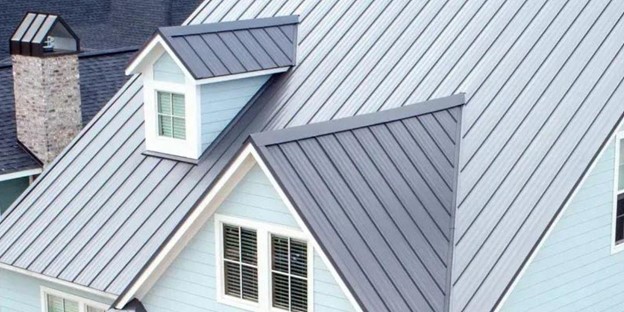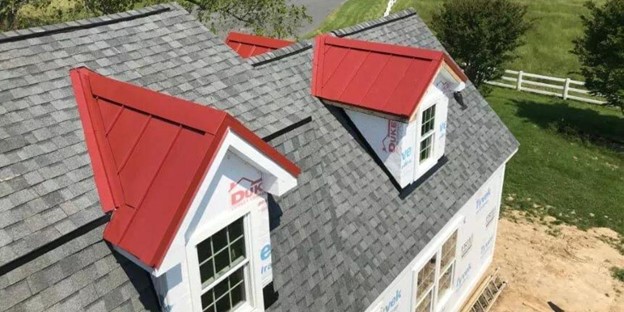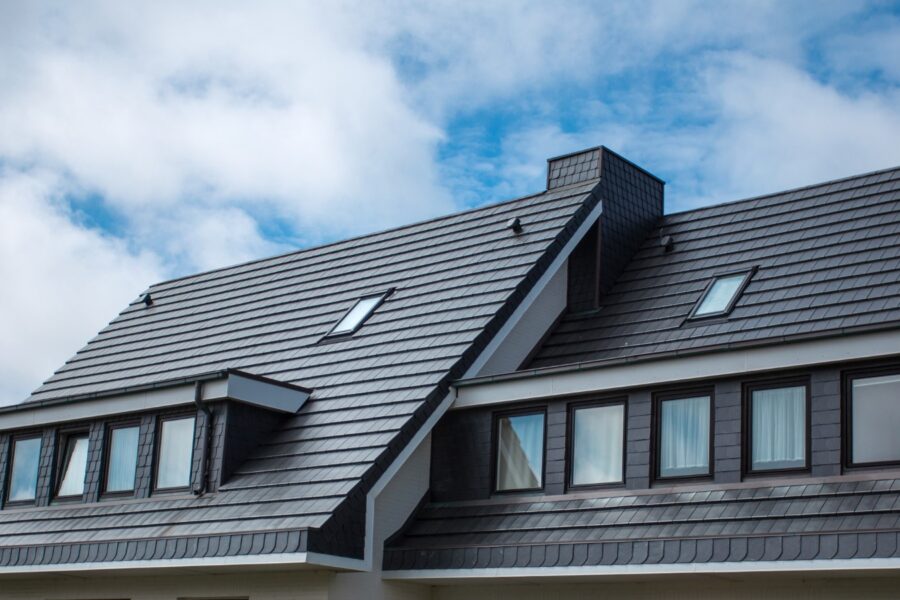When it comes to home improvement projects, homeowners need accurate estimates to create realistic budgets. Roof replacement, in particular, is a significant investment that can also be hard to estimate.
Unless you’ve had work done on your roof recently, you probably don’t know exactly how large your roof is. And that can be a major hurdle in estimating the cost of a roof replacement. So what can you do?
You can wait for a contractor to come out and measure, or you can harness technology: use a satellite imagery estimation tool to evaluate the size of your roof. Satellite technology now allows you to calculate the square footage of your roof and receive a ballpark estimate of the cost, all from your computer.
In this article, D.C. roofing contractor Capitol Improvements will walk us through how satellite imagery can be used to calculate roof replacement costs accurately and efficiently, plus other factors to consider.

Source: Austin Jewell, Capitol Improvements
The Basics of Satellite Imagery in Roof Cost Estimation
Satellite imagery is at the forefront of home improvement innovation, especially when it comes to roof replacement projects. By capturing high-resolution images from space, this technology can offer an accurate perspective on the dimensions of your roof.
Satellite imagery lets you calculate your roof replacement costs without the physical challenges and risks associated with traditional roof inspection methods. It’s also much faster and more convenient than waiting for an inspector to give you the number.
When you know the general size of your roof, you can communicate more effectively with roofing contractors who might want to take the job. With this square footage in hand, you can ask for ballpark estimates from your contractor more easily and have a frame of reference when the contractor does measure your roof. Many satellite roof estimate platforms will also provide you with an estimate easily online.
Advantages of Using Satellite Imagery Over Traditional Methods
Calculating the cost of your roof replacement using satellite imagery has many benefits for you as the homeowner.
No Physical Risk
One of the most compelling benefits is the reduction of physical risk. If you’ve been considering getting up on your roof to measure the square footage yourself so that you can understand potential costs, you no longer have to. You can get an estimate of your roof’s square footage without ever stepping foot outside.
Fast and Easy
Another major advantage is that you don’t have to schedule a time for a contractor to come out to your home and measure the roof, which can take weeks in some busy locations. You can get the information you need to start thinking about your budget right away.
Regional Accuracy
Finally, many roof replacement cost estimators that use satellite imagery take your region into account, giving you a more accurate idea of how much a replacement will cost. According to Capitol Improvements, a D.C. roof contractor with a satellite roof cost calculator, location can make a big difference when it comes to roof replacements.

Source: Pat Jewell, Capitol Improvements
Step-by-Step Guide to Calculating Your Roof Replacement Cost
Calculating your roof replacement cost with the assistance of satellite imagery is relatively simple. Here’s what you should expect.
Step 1: Choose a Satellite Roof Estimate Tool
There are various satellite roof estimate tools available, such as EagleView, RoofSnap, and Hover. Your local roofing contractor may also have a roof cost estimation tool on their company website that uses satellite imagery.
Step 2: Create an Account if Required
Sign up for an account on the chosen platform. Some tools may offer free trials or demo versions, while others might require a subscription or one-time fee. You’ll often need to provide at least your email address.
Step 3: Input Your Address
Enter the address of the property where the roof replacement is needed. The tool will use satellite imagery to locate your home.
Step 4: Select Your Roof Type
Some tools let you specify what type of roof you have (e.g., gable, hip, flat). This information can help the tool generate more accurate measurements and cost estimates.
Step 5: Review the Satellite Imagery
The tool will display satellite images of your roof. Verify that the imagery matches your property. Some tools allow you to make adjustments if the initial images are not accurate.
Step 6: Select Roofing Materials
Choose the type of roofing material you plan to use for the replacement (e.g., asphalt shingles, metal, tile). Different materials have varying costs, so this step is crucial for an accurate estimate.
Step 7: Generate the Estimate
With all the information entered, the tool will generate a detailed cost estimate. Review the breakdown of costs to understand where your money will be spent.
Step 8: Calculate Additional Costs
Consider any additional costs that might affect the overall estimate, such as:
- Removal of the old roof
- Disposal fees
- Labor costs
- Permits
- Additional features like gutters or skylights
Step 9: Save and Compare Estimates
Save the estimate provided by the tool. It’s a good idea to compare estimates from multiple tools and later consult with local roofing contractors to ensure you’re getting a fair price.
Step 10: Plan Your Budget
Use the estimate to plan your budget for the roof replacement. Ensure you have a contingency fund for any unexpected expenses that might arise during the project.
Understanding the Factors That Influence Roof Replacement Costs
When planning for a roof replacement, it’s essential to understand the various factors that can influence the overall cost. Here’s a detailed breakdown of the key elements that affect the price of a roof replacement.
Roof Size and Complexity
The size of your roof is one of the most significant cost determinants, which is why satellite estimation tools are so useful. Roofers measure the size of your roof in square feet, and larger roofs require more materials and labor.
Additionally, it’s important to keep in mind that roofs with complex designs, multiple levels, or intricate features such as dormers and valleys will typically cost more to replace.
Roof Pitch and Slope
Another factor that influences the cost is your roof’s pitch and slop. A steeper roof is more challenging and time-consuming to work on, leading to higher labor costs.
Difficult-to-access roofs can also increase labor costs due to the need for special equipment or additional safety measures.
Roofing Materials
Different roofing materials have varying costs. Common options include asphalt shingles (cost-effective), metal (moderately expensive), and tile or slate (high-end).
Higher-quality materials often come with longer lifespans but at a higher initial cost.
Labor Costs
Labor costs for a roof replacement can vary significantly based on your location. Urban areas or regions with higher living costs typically have higher labor rates.
Different contractors also have different labor costs. Hiring a reputable, experienced contractor might cost more upfront, but it can save money in the long run through better workmanship and fewer mistakes.
Removal of Old Roof
Removing the existing roof can also add to the overall cost. This includes labor for removal and disposal fees for the old materials.
If there are multiple layers of old roofing, the removal process will be more labor-intensive and expensive.
Roofing Accessories and Additional Features
The type and quality of the underlayment and insulation features of the roof can impact the cost. High-quality underlayment provides better protection but at a higher price.
Replacing or adding flashing, vents, and other roofing accessories can add to the cost, too.
If you’re also replacing gutters or installing skylights, these features will increase the total expense as well.
Permits and Regulations
Depending on your location, you might need to obtain permits for a roof replacement. Permit costs vary by municipality.
Additionally, compliance with local building codes might require specific materials or construction methods, impacting overall costs.
Weather Conditions
Due to higher demand, roofing is often more expensive during peak seasons (spring and summer).
Adverse weather conditions can also delay the project, potentially increasing labor costs.
Warranty and Insurance
Opting for materials with extended warranties or hiring contractors who offer workmanship guarantees can increase initial costs but provide long-term value.
You’ll also want to ensure that your contractor has adequate insurance coverage, which might slightly increase the cost but provides protection against potential damages or accidents.
In Summary
Using satellite roof estimation tools can significantly streamline the process of planning a roof replacement. These tools provide accurate initial estimates quickly and conveniently, allowing you as the homeowner to get a clear picture of potential costs without the need for an on-site visit.
However, keep in mind that this initial estimate is just the starting point. You’ll also need to consult with professional roofers, compare multiple estimates, and negotiate terms.
Still, using satellite roof estimation tools at the beginning of your planning process not only saves time but also enhances the accuracy of your initial budgeting.
Discover more from Futurist Architecture
Subscribe to get the latest posts sent to your email.



